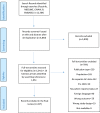Systematic review of health-related quality of life (HRQoL) issues associated with gastric cancer: capturing cross-cultural differences
- PMID: 35689705
- PMCID: PMC9225973
- DOI: 10.1007/s10120-022-01309-6
Systematic review of health-related quality of life (HRQoL) issues associated with gastric cancer: capturing cross-cultural differences
Erratum in
-
Correction to: Systematic review of health-related quality of life (HRQoL) issues associated with gastric cancer: capturing cross-cultural differences.Gastric Cancer. 2023 Jan;26(1):167. doi: 10.1007/s10120-022-01346-1. Gastric Cancer. 2023. PMID: 36269499 Free PMC article. No abstract available.
Abstract
The treatment landscape for gastric cancer (GC) is constantly evolving with therapies affecting all aspects of health-related quality of life (HRQoL) which need careful monitoring. While there are HRQoL measures designed specifically to capture issues relevant to patients with GC, these might be outdated and only relevant to patients in westernised cultures. This review identifies the patient-reported measures used to assess HRQoL of patients with GC and compares the HRQoL measures used across cultures including East Asia, where GC is more prevalent. We conducted a systematic review of publications between January 2001 and January 2021. A total of 267 papers were identified; the majority (66%) of studies involved patients from East Asian countries. Out of the 24 HRQoL questionnaires captured, the European Organisation for Research and Treatment of Cancer Core Cancer measure (QLQ-C30) was the most widely used (60% of all studies and 62% of those involving patients from East Asian countries), followed by its gastric cancer-specific module (QLQ-STO22, 34% of all studies and 41% from East Asia). Eight questionnaires were developed within East Asian countries and, of the 20 studies including bespoke questions, 16 were from East Asia. There were six qualitative studies. HRQoL issues captured include diarrhoea, constipation, reflux, abdominal pain and abdominal fulness or bloating, difficulty swallowing, restricted eating, and weight loss. Psychosocial issues related to these problems were also assessed. Issues relating to the compatibility of some of the westernised measures within East Asian cultures were highlighted.
Keywords: Cross-cultural comparison; Gastric cancer; Health-related quality of life; Patient-reported outcome measures.
© 2022. The Author(s).
Conflict of interest statement
This work supported by funding received from the European Organisation for Research And Treatment of Cancer Quality of Life Group awarded to SS, MT and VV (Grant reference 003–2019). MG received funding from the Norwegian Cancer Society (grant number 190188–2017). CM’s PhD. is funded by the Novo Nordisk UK Research Foundation. All other authors have no conflict of interest to declare.
Figures
References
-
- Al-Batran S-E, Homann N, Schmalenberg H, Kopp H-G, Haag GM, Luley KB, et al. Perioperative chemotherapy with docetaxel, oxaliplatin, and fluorouracil/leucovorin (FLOT) versus epirubicin, cisplatin, and fluorouracil or capecitabine (ECF/ECX) for resectable gastric or gastroesophagealjunction (GEJ) adenocarcinoma (FLOT4-AIO): a multicenter, randomized phase 3 trial. J Clin Oncol. 2017;35(15S):4004–4004. doi: 10.1200/JCO.2017.35.15_suppl.4004. - DOI
-
- Kang YK, Boku N, Satoh T, Ryu MH, Chao Y, Kato K, et al. Nivolumab in patients with advanced gastric or gastro-oesophageal junction cancer refractory to, or intolerant of, at least two previous chemotherapy regimens (ONO-4538-12, ATTRACTION-2): a randomised, double-blind, placebo-controlled, phase 3 trial. Lancet. 2017;390(10111):2461–2471. doi: 10.1016/S0140-6736(17)31827-5. - DOI - PubMed
Publication types
MeSH terms
LinkOut - more resources
Full Text Sources
Medical
Miscellaneous


